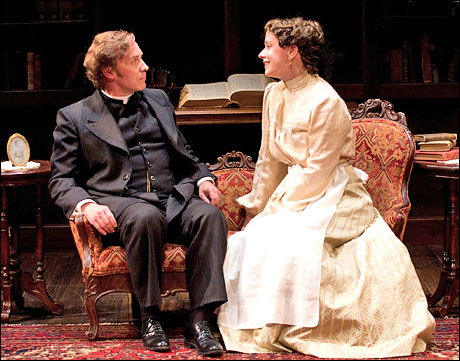Today’s Wall Street Journal drama column is devoted in its entirety to a Chicago-area show, Writers’ Theatre’s premiere production of A Minister’s Wife. Here’s an excerpt.
* * *
Music was George Bernard Shaw’s first love, and he claimed that his plays were operas in disguise. Yet few composers have found inspiration in the chilly glitter of his dialogue, and only one musical version of a Shaw play, “My Fair Lady,” has hit the bull’s-eye–until now. Austin Pendleton, Josh Schmidt and Jan Tranen have turned “Candida” into a chamber musical called “A Minister’s Wife” that is the talk of Chicagoland. No doubt it will find its way to New York in time, though I wouldn’t wait for that to happen if I were you. Not only is “A Minister’s Wife” the most fully realized piece of musical theater to come along since “The Light in the Piazza,” but I can’t imagine anyone improving on the quiet delicacy of Writers’ Theatre’s premiere production….
 What the makers of “A Minister’s Wife” have added to “Candida” is the warmth that its author left out–yet they have accomplished this transformation without doing violence to the letter of Shaw’s play. Mr. Pendleton, the author of “Orson’s Shadow,” has done a remarkable job of compressing a tightly written three-act play into an even tighter one-act libretto that runs for roughly 90 intermission-free minutes. No less striking are Ms. Tranen’s plain-spoken yet poignant lyrics, which heighten the emotions concealed in Shaw’s neatly turned prose…
What the makers of “A Minister’s Wife” have added to “Candida” is the warmth that its author left out–yet they have accomplished this transformation without doing violence to the letter of Shaw’s play. Mr. Pendleton, the author of “Orson’s Shadow,” has done a remarkable job of compressing a tightly written three-act play into an even tighter one-act libretto that runs for roughly 90 intermission-free minutes. No less striking are Ms. Tranen’s plain-spoken yet poignant lyrics, which heighten the emotions concealed in Shaw’s neatly turned prose…
Josh Schmidt first came to the attention of New York audiences two seasons ago with his score for “Adding Machine,” a musical so glitteringly crafted that I initially took its self-assurance for glibness. No one will make that mistake about the music that Mr. Schmidt has written for “A Minister’s Wife.” Atop a crisply chattering minimalist-style instrumental accompaniment that evokes the typewriter used by Morell’s secretary to transcribe his sermons, Mr. Schmidt flings long, tender arcs of melody that cling to the ear like phrases from old love letters. The results are at once strongly contemporary and immediately engaging….
* * *
Read the whole thing here.
Archives for June 26, 2009
TT: How dances disappear
Merce Cunningham, who turned ninety this year, has announced that his world-famous dance company will be disbanded after he dies. That’s a big story, bigger than you might think if you don’t follow dance closely. Most choreographers, after all, do their best to ensure that their companies will outlive them. Why has Cunningham decided otherwise? Because he thinks his dances have a better chance of surviving over the long haul if his associates concentrate on making them available to other companies instead of keeping his own troupe going.
This decision is the subject of my “Sightings” column for Saturday’s Wall Street Journal, in which I talk about the inherent fragility of dance–and what choreographers can do to circumvent it. To see what I have to say, pick up a copy of tomorrow’s Journal.
UPDATE: Read the whole thing here.
* * *
An excerpt from Cunningham’s “Beach Birds for Camera,” danced by the Merce Cunningham Dance Company:
TT: Almanac
“What makes old age hard to bear is not the failing of one’s faculties, mental and physical, but the burden of one’s memories.”
W. Somerset Maugham, Points of View
